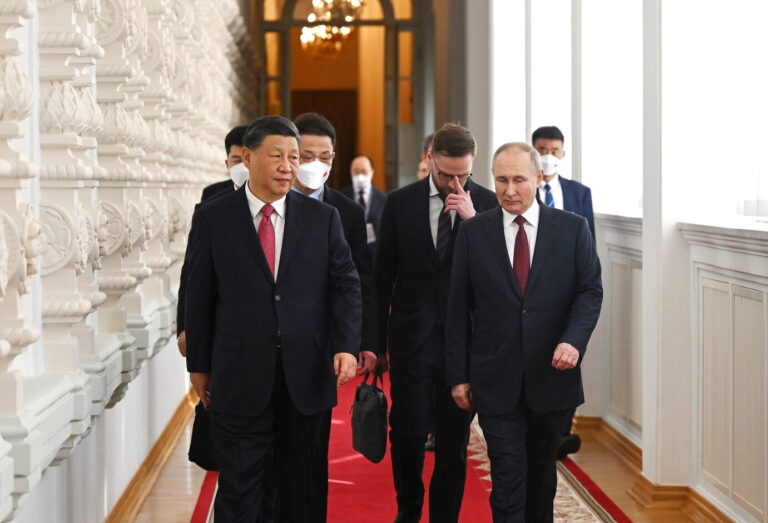It served to further tighten economic ties between Russia and China and lay the groundwork for a “new world order” the long-awaited meeting between Putin and Xi Jinping in Moscow that ended today.
“Shoulder to shoulder against Western hegemony.” In an article signed by Vladimir Putin for China’s People’s Daily, on the eve of Xi Jinping’s historic visit to Moscow, the strategy of the new Russian-Chinese-led world order is summed up.
Or, rather Sino-Russian, with tentacles across continents that include allies such as Syria and Iran in the Middle East (newly rappacified with Saudi Arabia thanks to Beijing’s mediation), sub-Saharan Africa, Venezuela and Brazil in Latin America. As well as North Korea and perhaps even at least neutral India.
Table of Contents
A glimpse of the “new world order”: Sino-Russian geopolitical influences in Africa and the Middle East
A glimpse of the condescension Putin can still count on, thanks to the iron pact with Xi’s China, came in the two votes at the UN on resolutions condemning the Russian invasion of Ukraine. In the second round, countries that had previously abstained voted against.
And after the handshake between the Iranians and Saudis that marked a real triumph for Chinese diplomacy, the state visit of the Syrian president, Bashar al-Assad, to the United Arab Emirates on Sunday also created agitation in Western chancelleries. The watchword is the return of Damascus to the Arab world in its own right.
The international media these days emphasize how the United States is trying to regain ground in Africa, a continent it had abandoned, starting with Chad. While Wagner’s Russian mercenaries have already succeeded in ousting the French from the Central African Republic and Mali.
In North Africa, it weighs the weapon of migratory flows that restart and press on the other coast of the Mediterranean, while the anti-Westernism of the heirs of Isis and Al-Qaeda smoulders under the ashes.
In the Middle East, as Russia and China redraw the map of world power, the Western bulwark represented by Israel suffers internally from protests against Benjamin Netanyahu’s announced justice reform. Not surprisingly, President Joe Biden telephoned the Israeli premier expressing disquiet and proposing to mediate.
Ukraine, the “Chinese peace” proposal
As for Ukraine, at the end of the second day of talks in Moscow, the Russian president outlined the framework for peace achievement. It is the 12-points Chinese peace plan that can be the basis for a future agreement on the conflict.
The war in Ukraine provided a constant backdrop to what was the highlight of Xi’s ‘three days’ in Moscow. Xi assured that China is working to revive the negotiations.
And the two countries urged the West to stop any action that further fuels the conflict. Because, in the event of further escalation, there can be no winners in a nuclear war.
In a joint statement with Cold War tones, Putin and Xi attacked the West. Both accusing the United States of “undermining” world security to maintain its “military predominance”. The two leaders also expressed “concern” about NATO’s growing presence and influence in Asia.
Sino-Russian commercial and energetic relations consolidated
The two powers want to expand road and rail links. Putin assured that Russia is ready to meet China’s growing demand for energy. And, he assured that “virtually all the parameters” of a second pipeline that will transport gas from Siberia to China have been agreed upon.
By 2030, Russian gas supply to China will rise to nearly 100 billion cubic meters per year. Also, 100 million tons of LPG will be supplied, as well as coal and nuclear fuel.
The Russian president also sees the potential to develop a northern maritime route with China. Trade volume between China and Russia reached a record last year of nearly $190 billion.
This year, Putin stressed, the value is expected to rise to over $200 billion. Moreover Xi, blatantly ignoring the international arrest warrant hanging over his host’s head, invited him to Beijing. A visit that could possibly be made later this year.












